BusinessEurope Headlines No. 2016-14
BusinessEurope Director General Markus J. Beyrer for talks in Japan
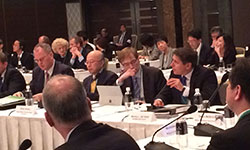 2016 can be a decisive year for EU-Japan free-trade negotiations. However, to be able to conclude an agreement this year both sides need to show political will to make progress on substance, including key issues like non-tariff barriers and public procurement, but also tariffs. This was the message conveyed by Markus J. Beyrer, BusinessEurope Director General, to EU and Japanese officials on 20 April during the EU-Japan Business Round Table, chaired this year by Kazuo Tsukuda (Senior Executive Adviser, Mitsubishi Heavy Industries, Ltd.) and Fabrice Brégier (President & CEO, Airbus S.A.S.). BusinessEurope was also present at the B7 summit that prepared recommendations from the business community to the G7 summit taking place at the end of May in Japan. Global economic challenges, digital revolution, trade and investment, climate change and overcapacity were among the topics addressed by business organisations from Canada, France, Germany, Italy, Japan, the UK, USA and the EU.
2016 can be a decisive year for EU-Japan free-trade negotiations. However, to be able to conclude an agreement this year both sides need to show political will to make progress on substance, including key issues like non-tariff barriers and public procurement, but also tariffs. This was the message conveyed by Markus J. Beyrer, BusinessEurope Director General, to EU and Japanese officials on 20 April during the EU-Japan Business Round Table, chaired this year by Kazuo Tsukuda (Senior Executive Adviser, Mitsubishi Heavy Industries, Ltd.) and Fabrice Brégier (President & CEO, Airbus S.A.S.). BusinessEurope was also present at the B7 summit that prepared recommendations from the business community to the G7 summit taking place at the end of May in Japan. Global economic challenges, digital revolution, trade and investment, climate change and overcapacity were among the topics addressed by business organisations from Canada, France, Germany, Italy, Japan, the UK, USA and the EU.
Contact: Luisa Santos
Talking tax at the Hanns Seidel Foundation
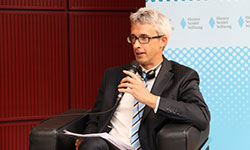 With European Commission proposals for anti-tax avoidance as well as further proposals for public reporting by multi-nationals now on the table, corporate tax reform will be a key issue in the coming months. In this context, BusinessEurope’s Director of Economics, James Watson took part in a panel debate organised by the Hanns Seidel Foundation on the issue on 6 April. Responding to other panellists including Stephen Quest, Director of the Commission’s DG TAXUD, he emphasised BusinessEurope’s support for the fight against tax fraud and evasion, but noted that EU response need to be proportionate and ensure our competitiveness in the global economy is protected. In particular, whilst we support country-by-country reporting of financial information by corporates to tax authorities, proposals that such information be made public risk undermining the role of tax authorities in enforcing tax rules, may create uncertainty for businesses and would make the EU a less attractive destination for foreign investment.
With European Commission proposals for anti-tax avoidance as well as further proposals for public reporting by multi-nationals now on the table, corporate tax reform will be a key issue in the coming months. In this context, BusinessEurope’s Director of Economics, James Watson took part in a panel debate organised by the Hanns Seidel Foundation on the issue on 6 April. Responding to other panellists including Stephen Quest, Director of the Commission’s DG TAXUD, he emphasised BusinessEurope’s support for the fight against tax fraud and evasion, but noted that EU response need to be proportionate and ensure our competitiveness in the global economy is protected. In particular, whilst we support country-by-country reporting of financial information by corporates to tax authorities, proposals that such information be made public risk undermining the role of tax authorities in enforcing tax rules, may create uncertainty for businesses and would make the EU a less attractive destination for foreign investment.
Read more or contact: James Watson
Better integrating economic considerations into social policy debates
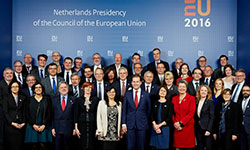 "The most urgent social challenge for Europe is to boost job creation and employment participation to reduce unemployment. Labour ministers have an important role in achieving this as part of a renewed EU strategy on flexicurity. Moreover, because Europe’s economic and social challenges are interlinked, it is essential to integrate economic considerations better into social policy debates. This is the case in the context of the European pillar of social rights, for example by ensuring consistency with ongoing efforts of economic ministers to achieve a more effective and efficient use of public expenditure, or to reduce the tax wedge on labour. This is also true for other EU social initiatives. For example, BusinessEurope and all its members are against the revision of the posting of workers directive, which we consider to be an attack on the single market". These were the key messages of Social Affairs Director Maxime Cerutti addressing the informal meeting of employment and social affairs ministers in Amsterdam on 19-20 April 2016.
"The most urgent social challenge for Europe is to boost job creation and employment participation to reduce unemployment. Labour ministers have an important role in achieving this as part of a renewed EU strategy on flexicurity. Moreover, because Europe’s economic and social challenges are interlinked, it is essential to integrate economic considerations better into social policy debates. This is the case in the context of the European pillar of social rights, for example by ensuring consistency with ongoing efforts of economic ministers to achieve a more effective and efficient use of public expenditure, or to reduce the tax wedge on labour. This is also true for other EU social initiatives. For example, BusinessEurope and all its members are against the revision of the posting of workers directive, which we consider to be an attack on the single market". These were the key messages of Social Affairs Director Maxime Cerutti addressing the informal meeting of employment and social affairs ministers in Amsterdam on 19-20 April 2016.
Contact: Maxime Cerutti
(Photo copyright: Rijksoverheid - Martijn Beekman)
China and anti-dumping: European Commission discusses with social partners
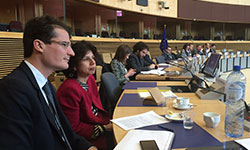 The European Commission organised a meeting on 15 April to consult social partners on anti-dumping and a possible change in the methodology used for China. We recall there was a public consultation regarding this issue that ran until 20 April. BusinessEurope restated its official position on China, asking for a thorough impact assessment and close coordination with other trading partners before a final decision is taken. The decision should be in line with the WTO but should consider that only Section 15 subparagraph (a)(ii) of China’s protocol of accession to the WTO expires while the remainder of the subparagraph remains in place. As a consequence there should be no automatic obligation to consider China as a market economy. Overall, participants also signalled the need to maintain trade defence instruments that can effectively address the real market situation in China.
The European Commission organised a meeting on 15 April to consult social partners on anti-dumping and a possible change in the methodology used for China. We recall there was a public consultation regarding this issue that ran until 20 April. BusinessEurope restated its official position on China, asking for a thorough impact assessment and close coordination with other trading partners before a final decision is taken. The decision should be in line with the WTO but should consider that only Section 15 subparagraph (a)(ii) of China’s protocol of accession to the WTO expires while the remainder of the subparagraph remains in place. As a consequence there should be no automatic obligation to consider China as a market economy. Overall, participants also signalled the need to maintain trade defence instruments that can effectively address the real market situation in China.
Contact: Luisa Santos or Maurice Fermont
Cooperation key to enforcement of consumer rights
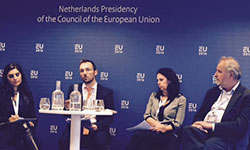 Harmonisation is not enough for businesses to benefit from a uniform and coherent application of EU law. It needs to be coupled with effective cooperation between national consumer authorities when applying and interpreting the rules. This is the logical approach in a growing digital single market, borderless by definition. This message was conveyed by Pedro Oliveira on behalf of BusinessEurope at the Consumer and Competition Day conference organised by the Dutch Presidency on 18 April in Amsterdam.
Harmonisation is not enough for businesses to benefit from a uniform and coherent application of EU law. It needs to be coupled with effective cooperation between national consumer authorities when applying and interpreting the rules. This is the logical approach in a growing digital single market, borderless by definition. This message was conveyed by Pedro Oliveira on behalf of BusinessEurope at the Consumer and Competition Day conference organised by the Dutch Presidency on 18 April in Amsterdam.
Contact: Pedro Oliveira
Services Passport must offer real added value for companies
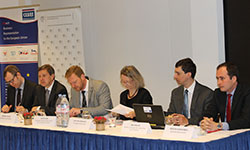 Despite the 2006 services directive and other initiatives, there are still till too many administrative and regulatory barriers that discourage companies, in particular SMEs, from providing services across borders. If well designed, the Services Passport proposed by the European Commission in its single market strategy could make their life easier. This was stressed by BusinessEurope Senior Adviser Jeroen Hardenbol during a breakfast debate organised by CEBRE and the Czech Permanent Representation to the EU on 19 April. This voluntary passport should reduce administrative burdens for companies by allowing them, with the passport, to skip certain administrative procedures and formalities already fulfilled and completed in the home member state. It should also lead to regulatory simplification and streamlining as public authorities become more aware of each other’s procedures and follow best practices. It is essential that companies in the construction and business services sectors are directly involved in its design to ensure that the passport meets business needs.
Despite the 2006 services directive and other initiatives, there are still till too many administrative and regulatory barriers that discourage companies, in particular SMEs, from providing services across borders. If well designed, the Services Passport proposed by the European Commission in its single market strategy could make their life easier. This was stressed by BusinessEurope Senior Adviser Jeroen Hardenbol during a breakfast debate organised by CEBRE and the Czech Permanent Representation to the EU on 19 April. This voluntary passport should reduce administrative burdens for companies by allowing them, with the passport, to skip certain administrative procedures and formalities already fulfilled and completed in the home member state. It should also lead to regulatory simplification and streamlining as public authorities become more aware of each other’s procedures and follow best practices. It is essential that companies in the construction and business services sectors are directly involved in its design to ensure that the passport meets business needs.
Read more or contact: Jeroen Hardenbol
Discussing research and innovation in Amsterdam
 Boosting innovation entails concrete benefits for growth, jobs and the planet. This objective requires stronger partnership between the industry, public sector and academia for an integrated innovation strategy. BusinessEurope Research & Technological Innovation Working Group, visiting Amsterdam on 14-15 April, focused on these topics when meeting government and industry representatives. The two-day programme in the Dutch capital, recently named European Capital of Innovation 2016, included a visit to the Innovation Expo, showcasing innovative applications for a more circular and sustainable urban space. BusinessEurope’s delegation also visited Shell Technology Centre, one of the three major centres worldwide, and Delta Start Up, working for a competitive ecosystem as the start-up hub. On 15 April, during the regular working group meeting, BusinessEurope members exchanged views with representatives of the Dutch Presidency on the Innovation principle, the so-called Innovation Deals, Horizon 2020 and the European Innovation Council. The business trip was organised in cooperation with our Dutch member federation VNO-NCW.
Boosting innovation entails concrete benefits for growth, jobs and the planet. This objective requires stronger partnership between the industry, public sector and academia for an integrated innovation strategy. BusinessEurope Research & Technological Innovation Working Group, visiting Amsterdam on 14-15 April, focused on these topics when meeting government and industry representatives. The two-day programme in the Dutch capital, recently named European Capital of Innovation 2016, included a visit to the Innovation Expo, showcasing innovative applications for a more circular and sustainable urban space. BusinessEurope’s delegation also visited Shell Technology Centre, one of the three major centres worldwide, and Delta Start Up, working for a competitive ecosystem as the start-up hub. On 15 April, during the regular working group meeting, BusinessEurope members exchanged views with representatives of the Dutch Presidency on the Innovation principle, the so-called Innovation Deals, Horizon 2020 and the European Innovation Council. The business trip was organised in cooperation with our Dutch member federation VNO-NCW.
Contact: Valentina Spina
Online trade, competition law and geo-blocking – squaring the circle?
 Agreements between suppliers and traders may limit the distribution of products through different channels and affect their availability online, or through platforms and across the single market. While these agreements must always comply with EU competition rules, it is important that rules provide for the right balance between all interests at stake, BusinessEurope Deputy Director Guido Lobrano highlighted at the Dutch Presidency’s European Consumer and Competition day on 18 April in Amsterdam. Geo-blocking in particular encompasses a variety of situations, and a one-size-fits-all approach should be avoided.
Agreements between suppliers and traders may limit the distribution of products through different channels and affect their availability online, or through platforms and across the single market. While these agreements must always comply with EU competition rules, it is important that rules provide for the right balance between all interests at stake, BusinessEurope Deputy Director Guido Lobrano highlighted at the Dutch Presidency’s European Consumer and Competition day on 18 April in Amsterdam. Geo-blocking in particular encompasses a variety of situations, and a one-size-fits-all approach should be avoided.
Contact: Guido Lobrano
(Photo copyright: Paul Voorham)
Effective monitoring mechanisms are key to the success of economic partnership agreements
 How to implement the monitoring of the economic partnership agreements, signed or currently negotiated between the EU and the African, Caribbean and Pacific countries, was discussed on 19 April at a workshop hosted by Joachim Schuster at the European Parliament. The discussion was timely as the European Parliament will soon consider the ratification of a number of such agreements. BusinessEurope focused on the concepts of trade and sustainable development under economic partnership agreements. These agreements are unique in their conception and structure, (a) being asymmetrical in terms of trade liberalisation (they give our partners full access to the EU market, whereas they allow for the gradual opening of our partners’ markets) and (b) having strong developmental characteristics by taking account of the particular social and economic context of our counterparts and offering financial assistance and capacity building. They also provide for the establishment of structures that allow the civil society to give input and recommendations on implementation and monitoring of the agreements. This is particularly important, as economic partnership agreements can be the ideal platforms to communicate on the benefits of trade and how these can be better distributed to all – companies, workers and consumers. However, in order for these monitoring mechanisms to be effective, they need to be inclusive and representative in their composition, use a broad range of indicators to capture and assess implementation of different areas covered by the agreement and be able to pass on and follow up on their recommendations to the parties to the agreement.
How to implement the monitoring of the economic partnership agreements, signed or currently negotiated between the EU and the African, Caribbean and Pacific countries, was discussed on 19 April at a workshop hosted by Joachim Schuster at the European Parliament. The discussion was timely as the European Parliament will soon consider the ratification of a number of such agreements. BusinessEurope focused on the concepts of trade and sustainable development under economic partnership agreements. These agreements are unique in their conception and structure, (a) being asymmetrical in terms of trade liberalisation (they give our partners full access to the EU market, whereas they allow for the gradual opening of our partners’ markets) and (b) having strong developmental characteristics by taking account of the particular social and economic context of our counterparts and offering financial assistance and capacity building. They also provide for the establishment of structures that allow the civil society to give input and recommendations on implementation and monitoring of the agreements. This is particularly important, as economic partnership agreements can be the ideal platforms to communicate on the benefits of trade and how these can be better distributed to all – companies, workers and consumers. However, in order for these monitoring mechanisms to be effective, they need to be inclusive and representative in their composition, use a broad range of indicators to capture and assess implementation of different areas covered by the agreement and be able to pass on and follow up on their recommendations to the parties to the agreement.
Contact: Sofia Bournou
Should national competition authorities have more powers to enforce competition rules?
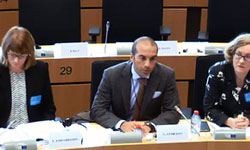 A well-functioning competition enforcement setting is the basis of a fair and growth-enhancing single market that benefits consumers and businesses. A fair, effective and balanced system based on consistent application of EU competition rules and on the respect of basic due process principles is needed. These were the messages BusinessEurope Deputy Director Guido Lobrano highlighted during a public hearing at the European Parliament on 19 April. Before awarding additional powers to the national competition authorities, we need to ensure a level playing field regarding due process and procedural guarantees for companies.
A well-functioning competition enforcement setting is the basis of a fair and growth-enhancing single market that benefits consumers and businesses. A fair, effective and balanced system based on consistent application of EU competition rules and on the respect of basic due process principles is needed. These were the messages BusinessEurope Deputy Director Guido Lobrano highlighted during a public hearing at the European Parliament on 19 April. Before awarding additional powers to the national competition authorities, we need to ensure a level playing field regarding due process and procedural guarantees for companies.
Contact: Guido Lobrano
Business and Dutch Presidency talk about how to make the single market better
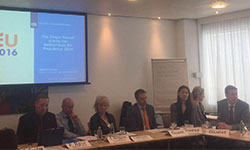 The single market is Europe’s main driver for growth and its performance directly impacts Europe’s competitiveness. Effective governance of the single market is crucial to reach its full potential and avoid fragmentation and legal uncertainty. BusinessEurope members discussed the follow-up of the European Commission single market strategy with Gerbert Kunst, Director European and International Affairs at the Dutch Ministry of Economic Affairs, during its Internal Market Policy Committee meeting on 14 April. Companies emphasised the need to ensure a well-functioning and competitive single market. BusinessEurope expressed willingness to cooperate further with the Dutch Presidency in this field.
The single market is Europe’s main driver for growth and its performance directly impacts Europe’s competitiveness. Effective governance of the single market is crucial to reach its full potential and avoid fragmentation and legal uncertainty. BusinessEurope members discussed the follow-up of the European Commission single market strategy with Gerbert Kunst, Director European and International Affairs at the Dutch Ministry of Economic Affairs, during its Internal Market Policy Committee meeting on 14 April. Companies emphasised the need to ensure a well-functioning and competitive single market. BusinessEurope expressed willingness to cooperate further with the Dutch Presidency in this field.
Contact: Guido Lobrano
Calendar
 22 April: meeting of the Eurogroup
22 April: meeting of the Eurogroup- 22 April: 'Towards a reinforced raw materials initiative', The Hague
- 24 April: presidential elections in Austria
- 25-29 April: Hannover Messe
- 27-28 April: European Parliament plenary sitting, Brussels